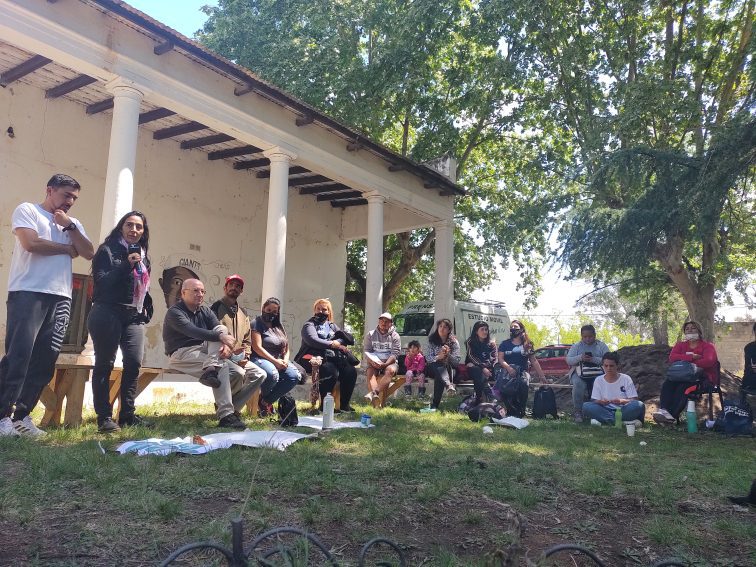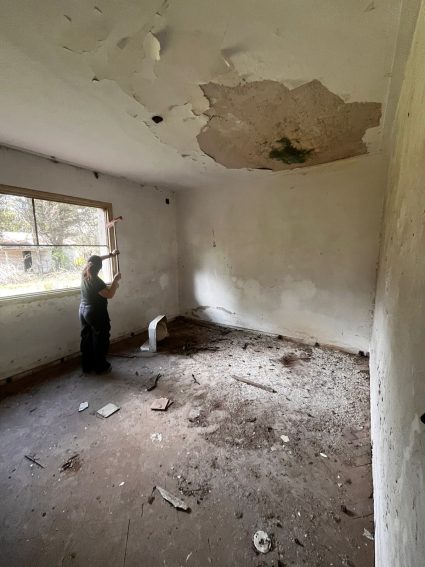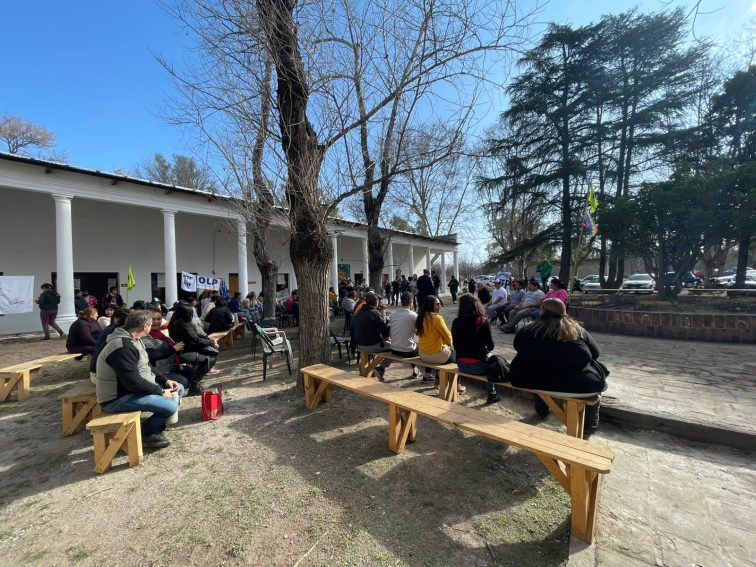El Refugio Libertad, Universidad Católica De Córdoba (Argentina)
El Refugio Libertad received Honorable Mention in the 2025 MacJannet Prize. The Refugio Libertad of Los Molinos, located in the province of Córdoba, Argentina, is a symbolic site that has been transformed by the community into a space of life, memory, and hope. This area, once a clandestine detention center during the last military dictatorship, now hosts a variety of community initiatives, ranging from gardens to educational projects. Women play a leading role in the organization and management of the Refugio, promoting gender equality in the rural area. The Catholic University of Córdoba has closely collaborated with the community in extension activities,[1] providing students with opportunities to learn and contribute through workshops, workdays, and research projects. This collaboration strengthens the bond between the university and the community, creating a space for mutual dialogue and cooperation. The Refugio Libertad also stands out as a site of memory and resistance, highlighting the importance of memory, truth, and justice in building a more just and democratic future.

We focus on analyzing the forms of political and social organization implemented by the Union of Workers for the Land (TraUT) at “Refugio Libertad”[2] in Los Molinos, Córdoba, Argentina as an expression of the popular economy organized around the Union of Workers of the Popular Economy (Avalle, Ferrero, and Hernández Bertone, 2023). Since 2020, we have been developing a university extension project from the Catholic University of Córdoba, where students and faculty participate in various activities in the territory, including political training workshops and workdays.
The objectives include recognizing the needs of the territory, suggesting and translating study materials into simple and accessible language, recording, systematizing, and reflecting on political training and work practices at Refugio Libertad. The methodology involves collaboration in donation campaigns, creating audiovisual content for social media, and participating in activities proposed by the community. Additionally, the “systematization of experiences” (Jara, 1994) is a methodological tool that allows for the construction or reconstruction of knowledge, organizing and systematizing it by formulating a central question from the records developed over a specific period. This process yields an organizing criterion, an axis for reorganizing this data that does not arise from prior theoretical interests or pre-established conceptual frameworks but rather emerges from the records themselves or from what the practices (Ciuffolini, et al., 2012) in the territory highlighted for those who began to traverse it.
Context of the Practice
Paradoxically, we find ourselves reflecting on and advocating for a practice of “freedom” in a local context where the rise of far-right movements, now in power, has appropriated “freedom” as synonymous with non-interventionist state policies and indiscriminate market freedom. The freedom proclaimed in this territorial experience is linked to a completely opposite horizon of meanings: the freedom to debate, produce, and work within the framework of strengthening community bonds and defending democracy.

The “Refugio” is a site located in a rural area formerly belonging to the Argentine Army. In 2018, it was reclaimed by workers from the popular economy with the aim of building an organized rural community. Our analysis focuses on the practices and strategies of collective organization that unfold in this productive and communal experience, with particular emphasis on the role of women and their relationship with rurality in the context of Córdoba.
Refugio Libertad is much more than a physical space; it is a symbol of resistance and hope amid adversity (Avalle, Ferrero, and Ciuffolini, 2023). It covers approximately 800 hectares and was previously home to the former Artillery Battalion 141 until 1993, which was abandoned and fell into disrepair. During the last military, civic, and ecclesiastical dictatorship, this place witnessed atrocities as a clandestine detention center.[3] After years of abandonment, it was reclaimed by the community in 2018 with the firm purpose of transforming it into a living space, to the point that it was declared a historical site of memory. In March 2020, this place was marked as a site of memory along with Nora Cortiñas, a Mother of Plaza de Mayo.[4]
In 2022, the Argentine Army conducted exercises that resulted in irreparable damage to both heritage and the environment.[5] Additionally, during the same year, an intentional fire consumed around 350 hectares of native forest.
The entrance to the barracks was through a central guardhouse, which included a barrier, two offices, and an area with three narrow cells for punishing conscripts. In 1976, during the dictatorship, these spaces were used to hold captive individuals without due process. Currently, there is an investigation into the possible presence of mass graves that may contain the remains of disappeared people. The infirmary stands out as the most notable structure on the premises, which was used as a place of captivity for kidnapped individuals. According to testimonies from former conscripts, in the first half of 1976, it was vacated and adapted as an illegal detention site.
Subsequently, thanks to the efforts of United Workers for the Land, this space was refurbished and now houses the National School of Community Organization and Popular Economy (ENOCEP), as well as the Adult Middle Level Educational Center (Cenma), a library, and the Margarita Zeniquel Cultural Refuge. Additionally, it offers diploma programs in popular economics and provides accommodation for delegations.
Today, Refugio Libertad is a hub of activities and projects aimed at promoting the well-being and autonomy of its inhabitants.[6] It hosts various cultural spaces, productive ventures, soup kitchens, educational facilities, and memorial sites. On its grounds, diverse initiatives take place, from community gardens to educational and vocational training projects, and it has a coordination space with the “Hogar de Cristo”[7] for addiction recovery and assistance to vulnerable sectors.

Refugio Libertad not only provides economic support to its residents but also fosters a sense of community and solidarity among them.[8] The participation of women in the organization and management of this space is particularly noteworthy. They play fundamental roles in all aspects of community life, from agricultural production to decision-making and conflict resolution. Their leadership and dedication are inspiring examples of how women can positively transform their environments and improve the quality of life for their families and communities (Avalle & Reinoso, 2022).
The importance of the good practices promoted in the organization and development of these rural communities, which function as true “democratic schools” is evident. In these communities, the assembly and collective debate are fundamental, acting as spaces where active participation and joint decision-making are cultivated. We highlight the fundamental role of women in leading and coordinating activities, as well as their protagonism in agricultural production and other community initiatives. Women’s participation in all aspects of community life reflects a gendered distribution of labor and decision-making, challenging traditional patriarchal structures. These collective processes not only strengthen cooperation and social solidarity but also educate participants in democratic practices, turning each assembly and debate into an open classroom of democratic and equitable learning.
Results, lessons, and opportunities
In this collaboration between the Universidad Católica de Córdoba and the Refugio Libertad community, the relevance of university extension as a tool for social development and the construction of collective knowledge has been highlighted (Caccia et al., 2020). As Brusilovsky points out, “extension practice constitutes a necessary response from the university to a structural situation of economic, social, and educational exclusion of popular sectors” (2000: p. 80).
Students have had the opportunity to step out of the classrooms and immerse themselves in rural reality, where they have been able to apply their theoretical knowledge in concrete contexts and learn from the experiences of the people inhabiting the territory. At the same time, the community has received support and collaboration from the university in carrying out projects and activities that promote their well-being and autonomy. This experience of mutual learning reflects the commitment of both parties to building a more inclusive and supportive future.
The university, as an educational institution, acknowledges its social responsibility and its capacity to contribute to the development of the communities it serves. In this sense, it is necessary to conceive of universities as knowledge-generating institutions that, on the one hand, must produce valid and relevant knowledge, in dialogue with the society in which they are embedded; and, on the other hand, as institutions that must be capable of generating transformations based on those deep understandings of reality (Mora Penagos, 2004; Boisier, 2005). For its part, the Refugio Libertad community demonstrates its willingness to share its knowledge and experiences with young university students, thus enriching the educational process and strengthening the bonds between academia and society.
In summary, the experience of Refugio Libertad in Los Molinos clearly illustrates the transformative potential of organized rural communities and the crucial role that women play in their leadership and management. The presence on the ground facilitated the creation of links between the university and the community, providing students with the opportunity to explore other forms of production and knowledge construction. Additionally, it underscores the importance of adapting to changing circumstances and seeking new forms of collaboration and teaching in times of crisis. This experience highlights the need to expand participation in community activities as an essential part of academic formation. Likewise, it emphasizes the value of memory, truth, and justice as foundations for building a more democratic and human rights-respecting society. The collaboration between the Universidad Católica de Córdoba and the Refugio community exemplifies a model of joint work committed to the well-being and integral development of individuals and their communities.
References
Avalle, G., Ferrero, M. M., & Hernández Bertone, J. (2023). El barrio como simiente de economía popular y comunitaria: Protagonismo de “los peores” en las políticas de Integración Socio Urbana en Argentina. Revista Prisma Social. 42, 27–50. https://revistaprismasocial.es/article/view/5133
Avalle, G., Ferrero, M. y Ciuffolini, M. (2023). “Experimentación política, organización comunitaria y economía popular en la provincia de Córdoba, Argentina. Estudio de casos urbanos y rurales de producción y gestión de lo común”. En Revista Política y Sociedad. 60 (1), 1-12. https://dx.doi.org/10.5209/poso.84089.
Avalle, G. y Reinoso, P. (2022). “Neoliberalismo y pandemia: estrategias de producción y reproducción para la subsistencia de los sectores populares en la ruralidad. La experiencia del territorio de Cochatalasacate, Punilla (Córdoba)”. En Revista Latinoamericana de Antropología del Trabajo. 6(14), 1-21. http://www.ceil-conicet.gov.ar/ojs/index.php/lat/article/view/1032
Boisier, G. (2005). Iniciativas para acciones sobre Responsabilidad Social Universitaria en AUSJAL- Documento. Santiago de Chile.
Brusilovsky, S. (2000). Extensión universitaria y educación popular. Experiencias Realizadas. Debates Pendientes. Buenos Aires: Eudeba.
Caccia, A. C., de la Vega Ávila Tulián, C., Dellea, G. M., & Latimori, V. (2020). En la contienda contra la racionalidad neoliberal:: una interpretación para las prácticas de responsabilidad social universitaria. Perspectivas. Revista De Ciencias Sociales, 5(9), 830–857. https://doi.org/10.35305/prcs.v0i9.191
Ciuffolini, M.A., Avalle, G. et. al. (2012). “Escribir las prácticas. Una propuesta metodológica para investigaciones de Extensión o de Responsabilidad Social Universitaria”. En Revista Studia Politicae. 25, 5-30.
Jara Holliday, O. (1994). Para sistematizar experiencias: Orientaciones teórico-prácticas. Alforja. Centro de Estudios y Publicaciones: San José de Costa Rica.
Mora, C.; Penagos, M. (2004). Lineamientos generales para la Responsabilidad Social Universitaria en AUSJAL- Documento. Bogotá.
[1] Project: Experiences of Community Organization and Popular Economy at Refugio Libertad: Spaces for Meeting and Knowledge Exchange. Director: Dr. Gerardo Avalle; Co-director: Dr. María Mercedes Ferrero. Assistant Professors: Dr. Paula Reinoso, B.A. Ana Caccia. Secretariat for University Outreach and Social Responsibility, Catholic University of Córdoba. Period 2021-2025.
[2] In english, it means “Freedom Shelter”.
[3] https://www.youtube.com/watch?v=6hrpKxWodSA
[4] https://www.youtube.com/watch?v=5quRVGyvHMI
[5] https://elresaltador.com.ar/denuncian-que-estan-realizando-practicas-militares-en-el-refugio-libertad/
[6] https://www.youtube.com/watch?v=kCJPOTMBK-g
[7] Federación católica que promueve centros barriales para asistir a personas vulnerables y con problemas de adicciones. https://hogardecristo.org.ar/about-us/que-es-lafghc/